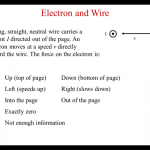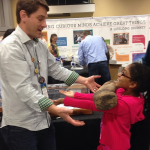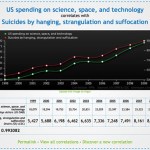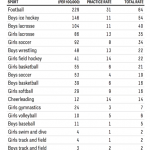Science
Being a cancer surgeon, I realize that my tendency is to view my blogging material through the prism of cancer, particularly breast cancer, my specialty. it's easy to forget that there are diseases every bit as horrible, some arguably even more so than the worst cancer. When I think of such diseases, it's not surprising that amyotropic lateral sclerosis (ALS), commonly known as Lou Gehrig's disease after its most famous victim. It's a progressive degenerative neurologic disease that affects the motor neurons, resulting in progressive muscle weakness throughout the body. Eventually, victims…
For the sixteenth episode of Uncertain Dots, we decided to bring in some guests, Andy Rundquist and Kelly O'Shea for a conversation about standards-based grading. This came up because I'm playing around with this using the same tiered scheme I talked about back in January.
This was a fun conversation, and some interesting ideas came up. I remain kind of boggled by the amount of oral exam time Andy puts in, and I find the notion of goal-less problems intriguing, but I'm not sure I could implement it here.
Some links:
Kelly on goal-less problems
Direct Measurement Video
So, anyway, that was…
tab clearing:
A collection of maths GIFs posted purely for aesthetic reasons.
Simple Fractals
Minimalist Posters of MathematicalObjects...
A little while back, I was put in touch with a Wall Street Journal writer who was looking into a new-ish health fad called "earthing," which involves people sleeping on special grounded mats and that sort of thing. The basis of this particular bit of quackery is the notion that spending time indoors, out of contact with the ground, allows us to pick up a net positive charge relative to the Earth, and this has negative health consequences. Walking barefoot on the ground, or sleeping on a pad that is electrically connected to ground via your house's wiring, allows you to replace your lost…
That recent study on active learning continues to generate some press, including a new interview with Carl Wieman about why traditional lectures are problematic. Wieman is pretty blunt about his opinions on the subject, which will come as no surprise to people in the AMO physics community...
Anyway, while most of the rest of the academic nation is into final exams and even graduation parties, we still have two more weeks of class after this one, and we're giving an exam tonight in my intro E&M class. Which means I'm still spending a lot of time thinking about this stuff. Some related…
Well, it snuck up on me again, the way it has a tendency to do every year. Maybe it's because Memorial Day is so early this year. Maybe it's because there's just so much work to do this week given the multiple grant deadlines. Whatever the case, it just dawned on my last night that today is the first day of the yearly autism quackfest known as AutismOne (AO), which is being held at the Intercontinental O'Hare Hotel near Chicago. Of course, things are different this year. Given the schism between team Crosby and pretty much everyone else in the antivaccine movement, it's unclear what the deal…
Rhett and I did the 15th episode of our Uncertain Dots hangout yesterday, commenting on a discussion started by Casey Rutherford about what we would like students coming into college physics to know. We had a slight difference of opinion about physics content, but agreed about the importance of algebra (which is like sunscreen).
I had meant to post this last night, but SteelyKid has made friends with the kids at one of the houses behind ours, so I spent a good chunk of the evening making sure she didn't climb over the fence into their yard. So, instead, you get to wake up with our physics…
While solo-parenting Sunday night, I still managed to get free of The Pip just barely in time to catch the start of Cosmos. This was a strange episode in a couple of ways, chiefly having to do with the selection of topics.
For one thing, there's no small irony in the fact that following a couple of weeks in which host Neil deGrasse Tyson has been raked over metaphorical coals for dismissing philosophy as pointless because it doesn't lead to testable predictions, a big chunk of the episode was given over to wildly impractical speculations about panspermia and related topics. I realize it's…
Every now and then, I run across a question in class that I genuinely don't know how to answer. If I'm lucky, this happens when I'm prepping a class, rather than when a student asks it live. Like today, when I noticed the above discussion question in my slides (reproduced at the bottom as well for those reading via RSS).
The discussion question itself is perfectly straightforward-- the current in the wire creates a magnetic field, the moving electron interacts with that, and getting the direction of the force is a straightforward right-hand-rule problem. I'll pose this to the class and ask…
Senior Review is out:
summary - Swift #1, then NuStar.
K2 gets partial funding. Spitzer is terminated.
Panel recommends not cutting off the bottom but balancing fields.
NASA Response to the 2014 Senior Review for Astrophysics Operating Missions - Final Version for Release (5.16.14) - this is an edited update of the NASA response that was on the website on the 15th of May. It is tagged as Final version and for release, so I guess it is now official.
Final Report Astro 2014 Senior Review Panel (pdf)
NASA Response to 2014 Senior Review for Operating Missions FINAL (pdf)
NASA used the…
Guest Blog By X-STEM Speaker Aaron A. Alford, PhD, MPH, PMP
Hands-on learning and human connections are essential to STEM education. Without exception, all of the scientists that I know were inspired to enter STEM career tracks by someone who helped them make an emotional connection to science and discovery.
As a scientist and an educator, I was absolutely thrilled to be a part of the X-STEM Extreme STEM Symposium and the USA Science & Engineering Festival in Washington, D.C. at the end of April. Both events provided a grand opportunity to interact with students and learners of all types…
A couple of weeks ago, io9 ran a piece about the old accusations that Robert Millikan manipulated his data for the electron charge with the headlineDid a Case of Scientific Misconduct Win the Nobel Prize for Physics? that got a lot of attention. I wasn't as impressed with this as a lot of other people, mostly because it's mostly just adding a clickbait headline to a story that's been around for decades, and doesn't even really engage with the various responses and defenses of Millikan, including this PDF that offers a (to my mind) fairly convincing argument that most of the argument turns on…
Over at Xykademiqz, a couple of weeks ago, there was a very nice post about the struggle to get students to write. "Very nice" here means that it's a good description of the problem, not that I'm glad anybody else has to deal with this.
I don't face quite the same thing-- my students generally aren't writing research papers for journals-- but getting senior theses written is often a bit of a chore. And I admit, I'm really bad about pushing students to do this in a systematic way. The problem is that, as I know from personal experience back when I was an undergrad and saber-tooth tigers…
Another week, another hangout with Rhett. In which we actually fielded a couple of questions from readers on Twitter, about the reason for inertia and a kind of meta-question. More audience questions would, of course, be welcome.
A couple of links to things that came up:
Mach's Principle, a past attempt to explain the origin of inertia.
Newton's famous refusal to explain gravity, "Hypotheses non fingo." Sir Isaac was second to none in his mastery of snotty condescension.
Veritasium's buoyancy quiz.
Aatish Bhatia's post about a new meta-analysis of "active learning" studies showing that…
I've been setting up schedules with my summer research students lately, and the main constraint we're facing with that is that I'm going to spend most of August in Europe. Part of this is pure vacation-- Kate and I are going to the UK for a couple of weeks. Part of it is the World Science Fiction Convention in London, in the middle of that trip, where both Kate and I expect to be on programming (though there aren't any set items this far out). And the last bit has just been officially announced: I'm speaking at the Nordita Workshop for Science Writers organized by Sabine Hossenfelder from…
Over the years, I've often likened alternative medicine to a religion—or even a cult. Basically, it requires belief in a set of precepts that have at best little and more commonly no evidence to support them that is often accompanied by magical thinking that a god-substitute, be it nature, one's body, or, of course, the magically mysterious "quantum," possesses magical powers that will protect one from all harm if one simply believes and acts on that belief. The belief systems that undergird various forms of alternative medicine are every bit as ridiculous from a scientific viewpoint as the…
Guest Blog by Festival X-STEM Speaker Dr. Jeffrey Bennett
Originally Posted on The Huffington Post May 9, 2014
What you cannot imagine, you cannot do.
--Astronaut Alvin Drew (STS-118, STS-133)
How many people are living in space right now? I've found that since the end of the Space Shuttle program, most Americans think the answer is zero, but it's not. There are currently six people living aboard the International Space Station, including two Americans (Steve Swanson and Rick Mastracchio), one Japanese citizen (Koichi Wakata), and three Russian cosmonauts. All the astronauts…
Last night's episode of the Cosmos reboot focused on one of the three physicists whose pictures Einstein kept in his office: Michael Faraday. I'm a big fan of Faraday, who famously started his career as a bookbinder's apprentice reading the books brought into the shop, and ended as one of the greatest experimental physicists of the 19th Century. Also, he had magnificent sideburns, as you can see in the picture. It's a great story-- I highly recommend his biography-- and pretty much the entire episode was devoted to Faraday, with only a surprisingly tenuous astronomy connection at the end,…
Besides yesterday being Mothers' Day yesterday, I had a lot of grant stuff to do, which means that this one will be a quickie. On Saturday, a reader sent me a link to one of the most useful sites I've ever encountered. I realize that over the weekend it's spread around the skeptical blogosphere like the proverbial wildfire, which is unfortunate (for me) given that I've made it a personal rule that I don't post on the weekend any more, barring amazing developments. Still, this one tempted me. It's a website called Spurious Correlations, and it is exactly what it claims to be. Its usefulness…
Over at Five Thirty Eight, Walt Hickey has a piece about cheerleading as a sport and injury rates, which is both a nice look at the way to use stats to measure the real danger level of an activity, and the sort of small details that can be teased out. The piece includes a table of injury rates for a wide variety of sports, seen above as the "featured image" and reproduced below. I don't really have anything much to say about cheerleading, but one thing did jump out at me from the table, leading to the question in the post title.
this table show concussion rates in competition and in practice…






